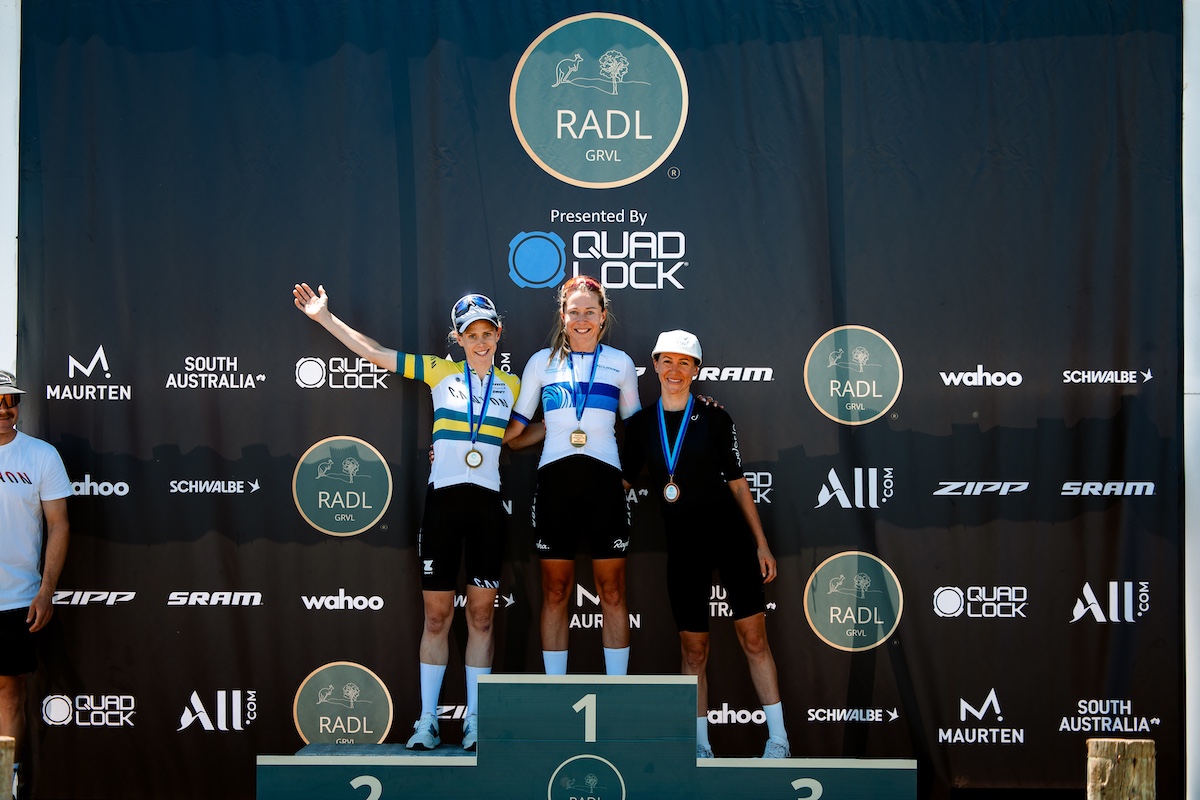Tour de France 2026 – All the route rumours ahead of the official presentation
The details we know about next summer's men's Tour de France and Tour de France Femmes
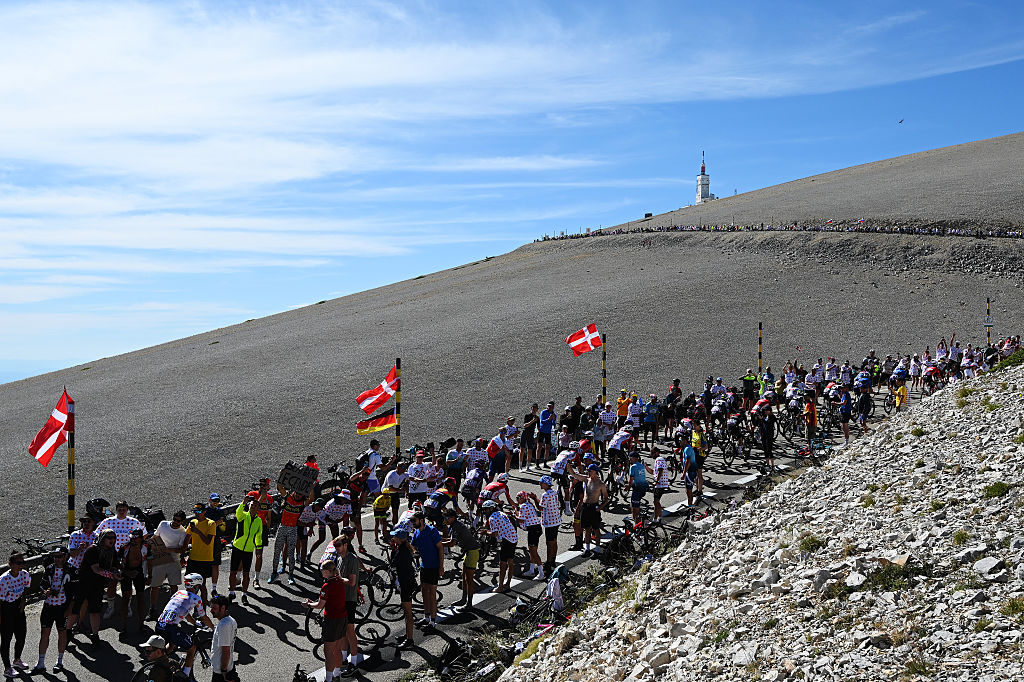
The latest race content, interviews, features, reviews and expert buying guides, direct to your inbox!
You are now subscribed
Your newsletter sign-up was successful
The routes for the 2026 Tour de France and 2026 Tour de France Femmes will be presented in Paris next week on Thursday, October 23. The race directors of the biggest races of the men's and women's calendars, Christian Prudhomme and Marion Rousse, will be on hand to show off the routes for next summer's races.
Joining them will be a host of the biggest names from both pelotons, keen to get a first glimpse of their future battlegrounds, while Cyclingnews will have live coverage of the presentation on the day, including full details of the race routes plus analysis and reactions from those key riders.
The 2026 men's Tour de France will run from July 4 to July 25, starting with a foreign Grand Départ in Barcelona, Spain. The 2026 Tour de France Femmes will run from August 1 to August 9, also with a foreign start in Lausanne, Switzerland.
The race route is kept under wraps until the day of the presentation by organisers ASO, but with plenty of planning done over the previous year – such as meetings with regional politicians and mass booking hotels – details always manage to leak out beforehand.
We've compiled all the information we've found ahead of the route presentations, including that always comprehensive source of information at Velowire, to put together a full overview of what we know about the men's and women's Tours right now.
Here's what Cyclingnews expects to see when the race routes are unveiled next week.
Tour de France Femmes 2026
What we know already: A Swiss Grand Départ
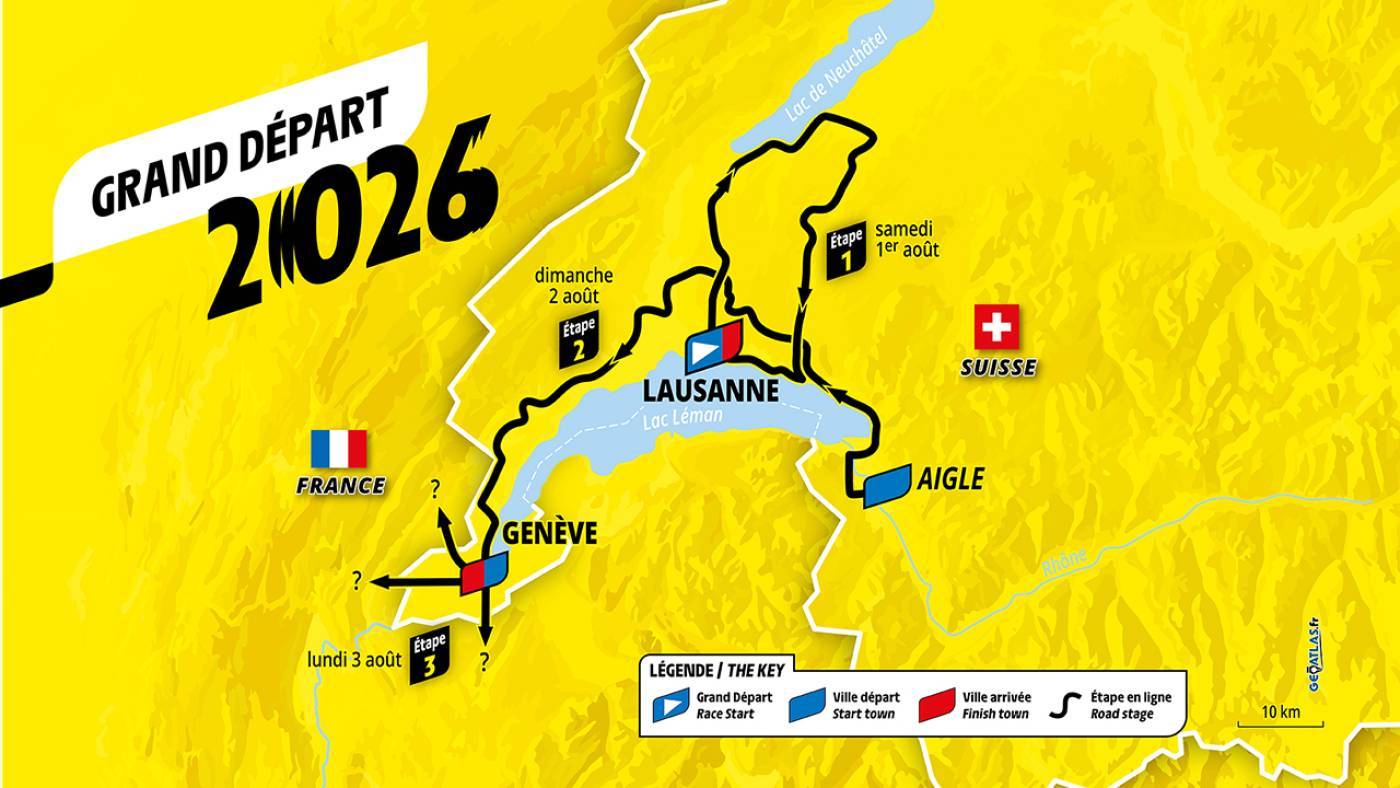
The 2026 Tour de France Femmes will start with the second foreign Grand Départ in the race's short history after it visited Rotterdam in the Netherlands in 2024. Next summer, the race will kick off in Lausanne in Switzerland, with the news announced back in June.
The latest race content, interviews, features, reviews and expert buying guides, direct to your inbox!
The full details of the opening stages of the race, two of which will be held entirely within Swiss borders, haven't yet been unveiled.
However, the 137km opening day will see the peloton set off from the banks of Lake Geneva before tackling a northern loop which takes the riders up to Lake Neuchâtel and over two climbs – one 3.5km long with an average of 6.1% and another 3.7km long at an average of 4.5%.
The hilly stage will then conclude back in Lausanne with a 2.3km, 5.4% climb on the way to the line, with a 400-metre finishing straight in the Place Saint-François hosting the finish.
Stage 2 will be run 150km between Aigle, the hometown of the UCI, and Geneva. Three climbs will fill out the route as the race skirts Lake Geneva and passes Lausanne heading west, though the final of the day's climbing tests will come 35km from the finish line.
When the Swiss Grand Départ was confirmed, race director Marion Rousse called stage 1 "a puncheuse-friendly opener" and said that the second day would host "a likely sprint finish."
The third stage of the race, run on August 3, will begin in Geneva and head into France. Beyond that, little is set in stone, though the Tour will be focussed around the south-east of France rather than venturing further afield or crossing the nation as it did in 2025.
A mid-race time trial in Dijon
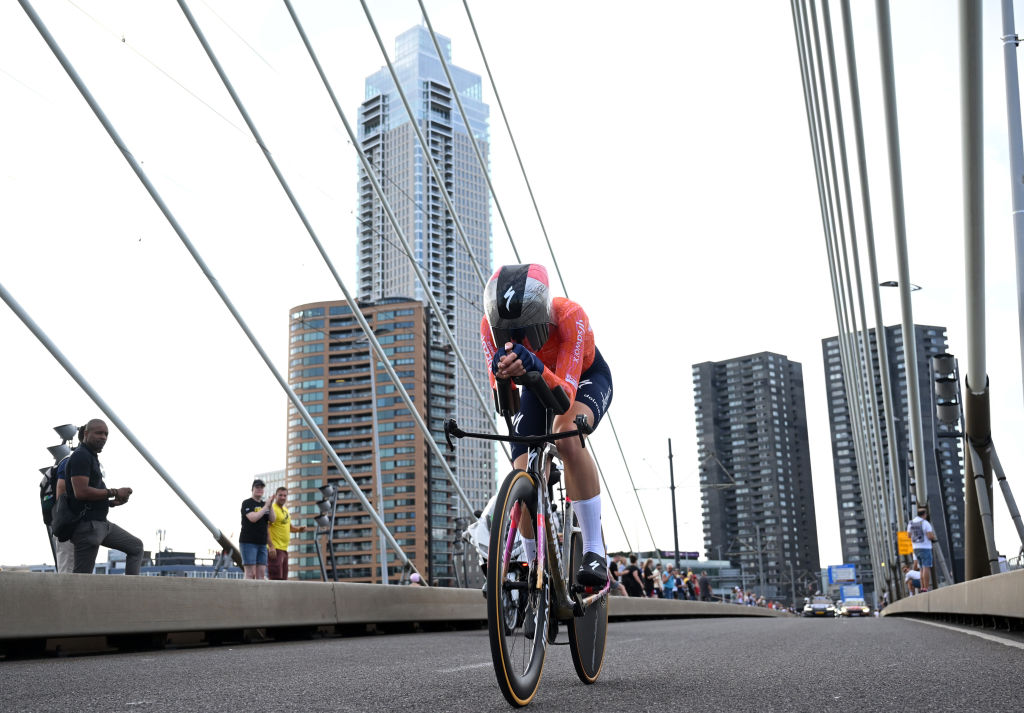
Stage 3 appears to be heading north to the Bourgogne-Franche-Comté region from Geneva, with a visit to the Jura Mountains possibly on the agenda.
Dijon – most recently host of a 2024 Tour de France sprint stage – is confirmed to host a time trial, which, given the information available about stages 3 and 5 (more below), will fit into stage 4.
Speaking to Ici back in July, Dijon Mayor Nathalie Koenders confirmed the news, saying, "It will be a time trial stage. Unlike a bunch sprint, you can savour the passage of each competitor.
"It shows that Dijon is an attractive and sporty city. I'd like to remind you that the Tour de France is one of the most followed sporting events in the world, and I am proud to host this women's stage."
Following the time trial, the race will head south into the Saône-et-Loire department for stage 5.
A report from local newspaper Le Journal de Saône-et-Loire earlier this month confirmed that the stage will start in Mâcon and conclude in Belleville-en-Beaujolais, although few other details of the route are clear.
Mont Ventoux queen stage and a possible Alpine finish
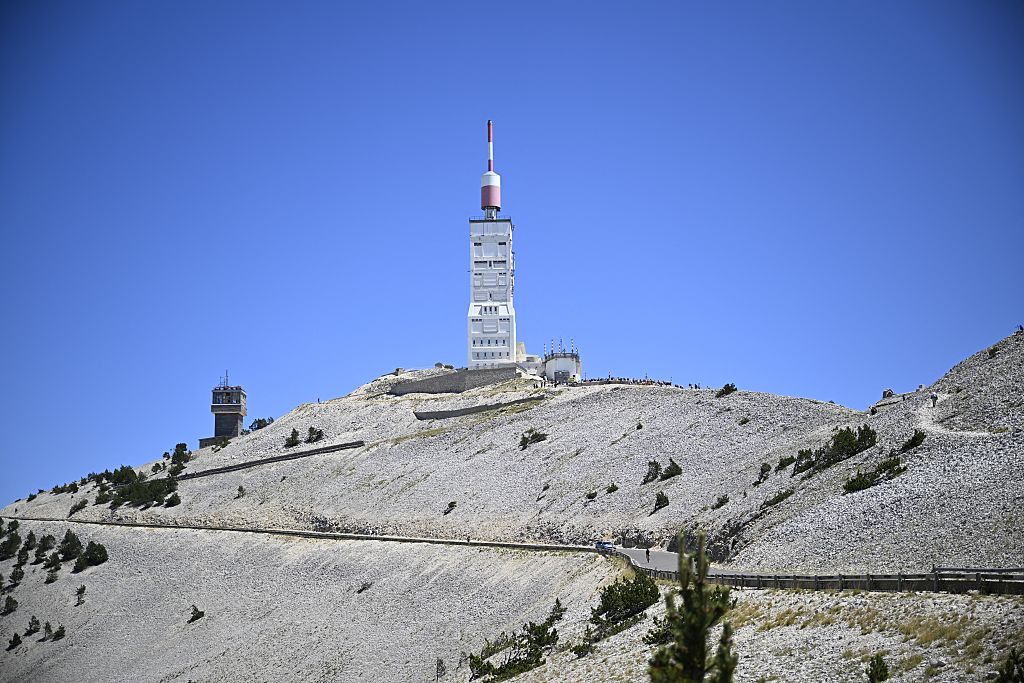
The race will continue south on stage 6, with regional newspaper Le Dauphiné Libére reporting that the stage will be the first of two in the Ardèche region.
The stage is set to run for around 100km, with Tournon-sur-Rhône hosting the finish. The town most recently hosted a pro race at the 2016 Critérium du Dauphiné, a hilly 187.5km stage won by Fabio Aru.
The next day, stage 7, is set to play host to the queen stage of the race, with Mont Ventoux on the menu – in keeping with the race's tradition of visiting a major Tour de France mountain each summer.
After La Planche des Belles Filles, the Col du Tourmalet, L'Alpe d'Huez, and the Col de la Madeleine, the Giant of Provence is the next challenge on the menu. The climb, tackled via its toughest side from Bédoin (15.6km at 8.7%), will host the finale of stage 7, which will set off from another town in the Ardèche region.
Mont Ventoux looks all set to feature as the main challenge of the 2025 race after playing its part as a legendary fixture of the men's race since its introduction in 1958. It may not have featured in a Tour de France Femmes before, but it has hosted the women's peloton on several occasions – Anna Kiesenhofer triumphed atop the climb on a stage of the 2016 Tour Cycliste Féminin International de l'Ardèche, while Marta Cavalli soloed to glory at the summit in the 2022 Mont Ventoux Dénivelé Challenge.
Beyond Mont Ventoux, details of the final days of the route have been few and far between ahead of the official route unveiling. Le Dauphiné Libére reports that the route "should once again be Alpine".
Through the first seven of its nine stages, the race seems to avoid the high Alps, though with previous editions of the Tour in 2022, 2024, and 2025 all featuring several hard mountain stages in the final weekend, it looks likely that the finale of the 2026 race will head into the Alps for another spectacular conclusion. (DO)
Tour de France 2026

What we know already: Barcelona Grand Départ
As is customary, we already know the route of the first few days of the Tour de France, with details of the Grand Départ in Barcelona already confirmed. The race will start with a 19.7km team time trial around the Catalonian capital, the first time the Tour has started with a TTT in several decades. They'll be hoping it goes a bit better than the Barcelona TTT that opened the Vuelta a España a few years ago (which ended in the dark as a storm rolled in).
The TTT has two categorised climbs towards the end, so it will be far from easy, and the time gaps already on stage 1 could be relatively significant, though probably not race-defining. Stage 2 is a 178km road stage from Tarragona back to Barcelona, with a really punchy parcours, harking back to the Grand Départ in the Basque Country in 2023. The first part running along the coast is quite straightforward, but on the outskirts of the city, the finale packs in eight categorised climbs, ending on a kicker too – the same finish at the TTT.
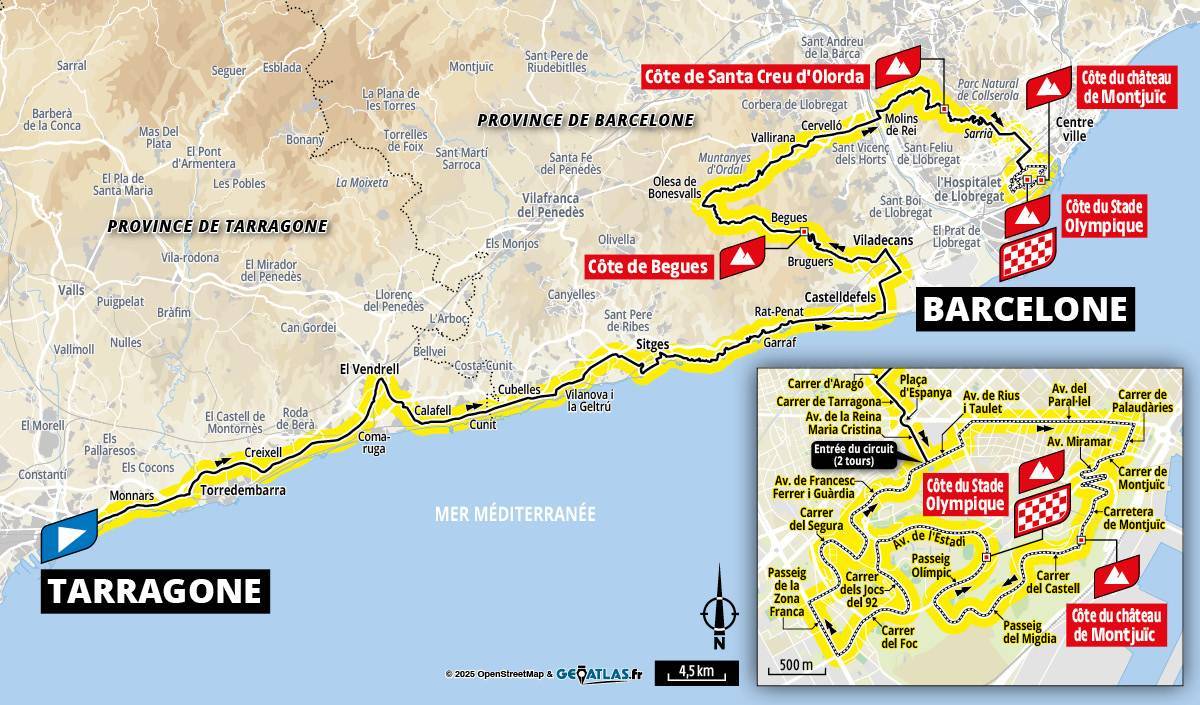
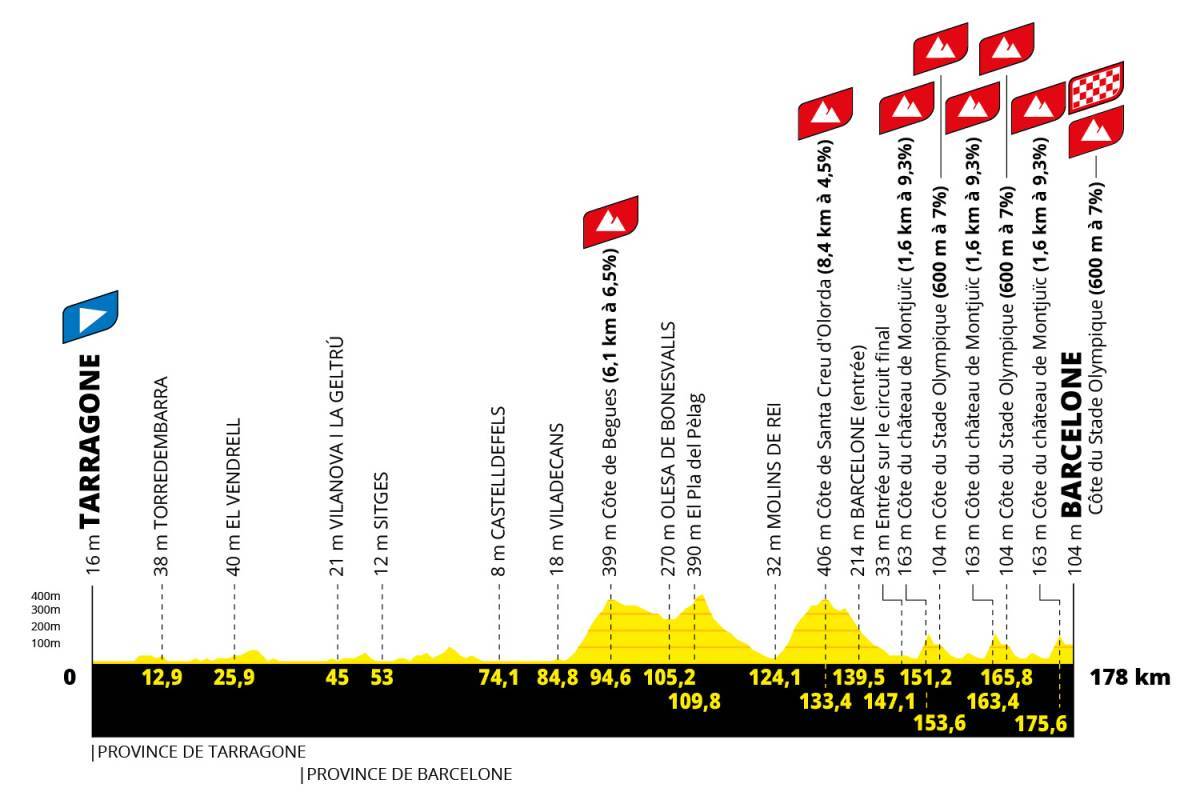
ASO have confirmed the start of stage 3, which will depart from Granollers on the outskirts of Barcelona, but they haven't officially announced the route or finish town. However, according to the French publication Ici Occitanie, the finish is set for the ski station in Les Angles. This is just over the border in France, so most of the stage will be running due north from Granollers across Catalonia into France. Finishing at a ski station also suggests that this will be the first summit finish of the race, with possible finish locations above 1,800m at Les Angles, marking a very early entrance to the mountains for the race.
Because of the start in Barcelona, the rest of the race is set for a fairly zig-zagging route, going all over the bottom half of France in a fairly circuitous manner before returning to Paris.
Week one: Across the Pyrénées and central France
Starting in Barcelona, the Tour de France organisers don't really have much of a choice but to fit the yearly visit to the Pyrénées into the first week, which will make for a tough start to the race, though the Pyrénées section of the race doesn't look to be as climb-packed as usually, according to rumours.
According to La Dépêche, stage 4 will start in Limoux and head west to Foix, though there are conflicting rumours about whether this could be a city-centre finish or atop a nearby climb. Stage 5 looks to finally be a more transitional stage, with La Nouvelle République des Pyrénées saying it will take place from Lannemezan to Pau. The same newspaper also revealed some info about stage 6, which will start in Pau – one of the Tour's favourite cities – and head to the Gavarnie-Gèdres ski station. They think this stage could also take in the Col d'Aubisque and Col du Soulor, two climbs not far from Pau that are often paired up in the Tour.
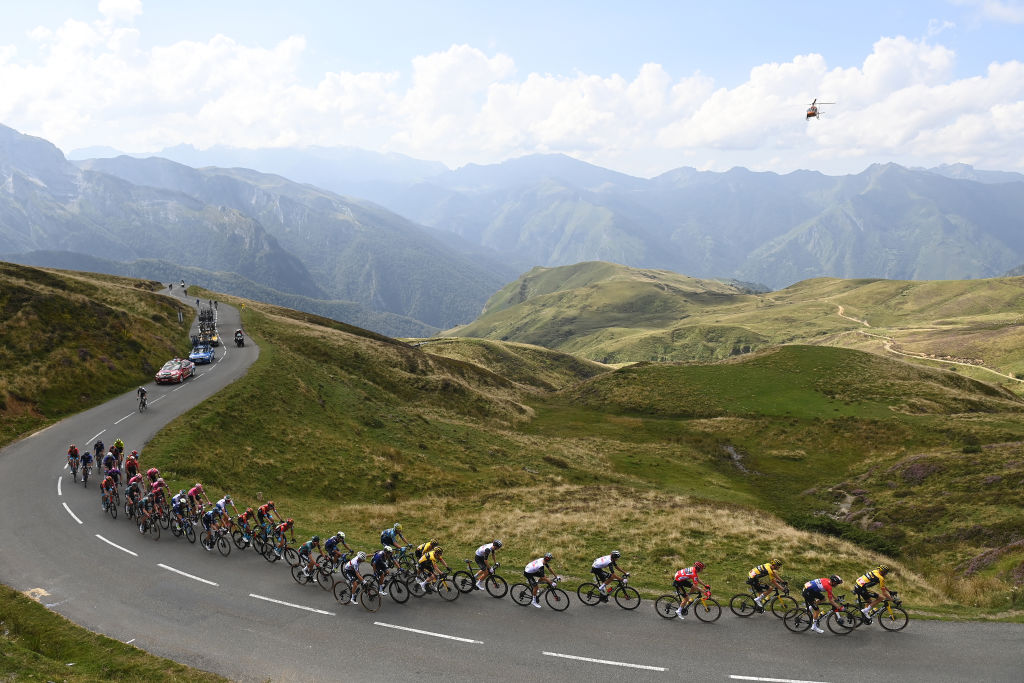
Stage 7 should see a day for the sprinters, as the race leaves the Pyrenees and heads north to Bordeaux, according to Sud Ouest, which would likely be a city centre sprint finish. The second weekend of the race looks set to head into the Dordogne region, according to Ici Dordogne, and then continuing heading east on stage 9.
Monday brings the first rest day of the race, which VeloWire report will be in Cantal in the Auvergne-Rhône-Alpes region.
Week two: From the Massif Central to the Vosges
Though out of the Pyrenees and not yet in the Alps, the second week looks set to pack in a good amount of climbing. Stage 10, on Bastille Day, is set to be a hilly day in the Massif Central, with La Montagne predicting a stage from Aurillac to Le Lioran, a resort in the Massif Central.
The next two stages could be more transitional stages, as the route looks set to head towards the north east of France and the Vosges. Rumours are abound, but the details around the exact stages in the region are sparse, but could see stage starts and finishes in Dole, Belfort, Mulhouse and Le Markstein. The Tour de France Femmes 2022 had several stages in this region, and the 2023 men's Tour had a finish in Le Markstein, so ASO know the good routes and finishes, and some testing medium climbs. There are rumours of a finish at La Planche des Belles Filles, but other publications seem to think that's not happening.
Stage 15, rounding out the first week, looks set to take the race to yet another mountain range, the Jura, with Le Progrès and Dauphiné Libéré predicting a stage between Champagnole and Plateau de Solaison, which would be a mountain-top finish.
The second rest day is set for Thonon-les-Bains, according to VeloWire's thorough research and reporting.
Week three: The Alps and a return to Alpe d'Huez
The final week should see the race culminate in the Alps, before returning to Paris for the finish. Stage 16 after the rest day will be a time trial, according to Dauphiné Libéré, likely starting or finishing in the rest day town of Thonon-les-Bains.
The next three days should bring in the key Alpine block of racing, but details are quite hazy. What is heavily rumoured, however, is the return of Alpe d'Huez, which hasn't been in the men's Tour de France since 2022, though was the finale of the women's race in 2024. The inclusion of the iconic climb seems almost certain, but we don't yet know on which stage it could be, with Dauphiné Libéré suggesting it could be on either stage 17 or 19.
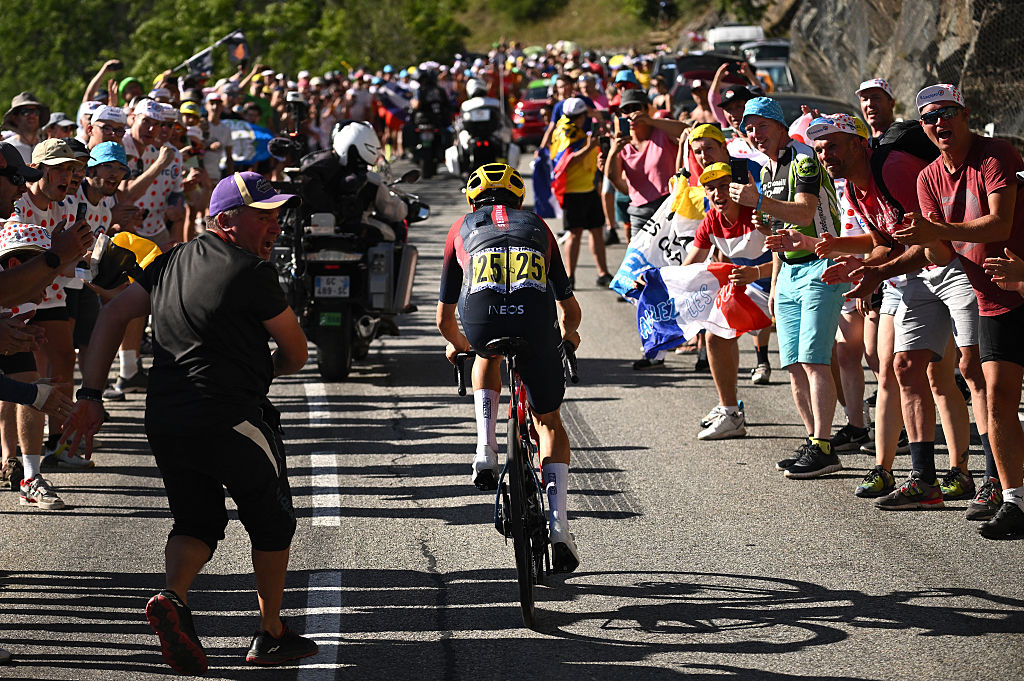
Other cities that look primed for a Tour de France visit during this Alps block are Gap and Chambéry, with the race set to visit Haute-Savoie ahead of the Super World Championships in 2026, and really give pride of place to the Alps in the 2026 route.
The stage for which there is very little information or rumours so far in stage 20. The final day of 'real' racing (at least traditionally) should be a key day, though sometimes it has been used as almost a transition stage in recent years. The stage should at the very least start in the Alps, but whether it's a climbing stage or an exit towards Paris is unknown. There is even the possibility that it could be a time trial, with some even imagining the idea of an Alpe d'Huez time trial. This would be a real spectacle.
Stage 21 returns to Paris, and after the success of last year, we're expecting the Paris circuit to once again include the Montmartre climb, and a much punchier route than the Champs-Élysées sprint finish of previous years. The only real question mark over this stage is which Parisian outskirts town it starts in, but all eyes will be on the finish anyway. (MP)
Visit Cyclingnews on Thursday, October 23 for full coverage of the Tour de France and Tour de France Femmes 2026 route presentations, including a live blog, full breakdowns of the routes, in-depth analysis and our early picks for yellow jersey contenders.

Dani Ostanek is Senior News Writer at Cyclingnews, having joined in 2017 as a freelance contributor, later being hired full-time. Her favourite races include Strade Bianche, the Tour de France Femmes, Paris-Roubaix, and Tro-Bro Léon.
You must confirm your public display name before commenting
Please logout and then login again, you will then be prompted to enter your display name.
